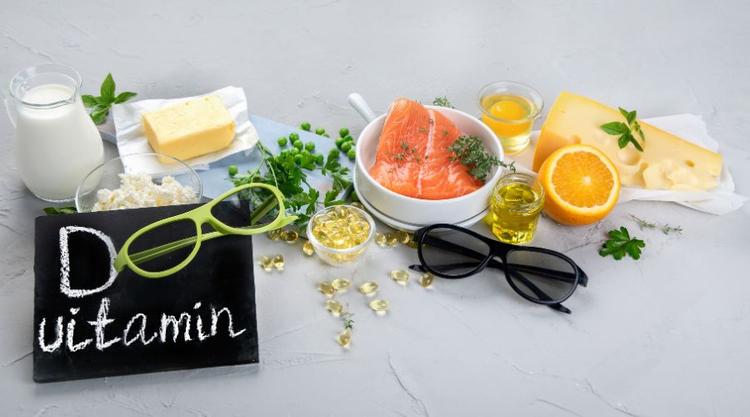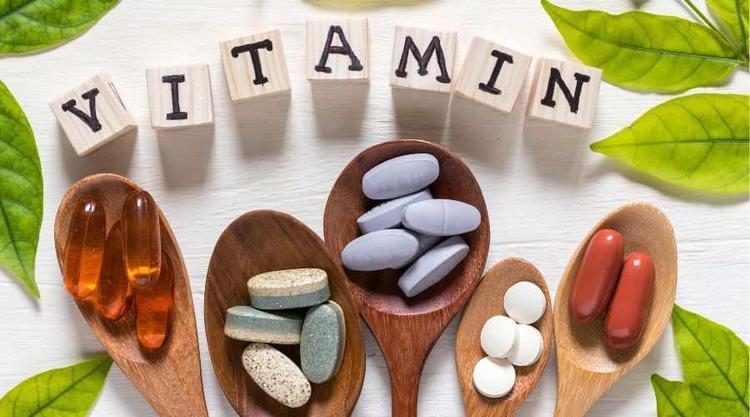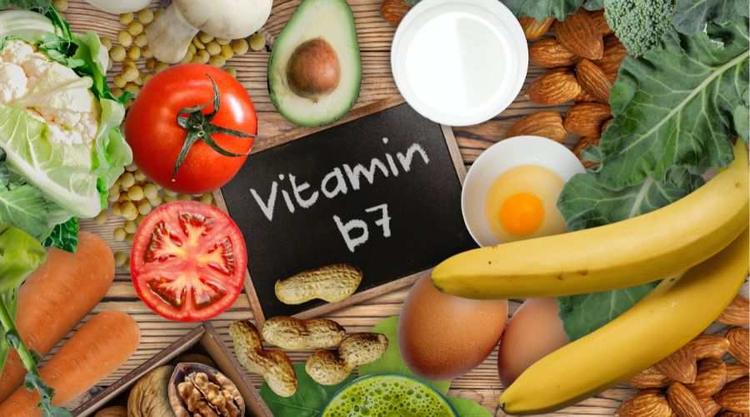Vitamin D3 Foods for Vegetarians: Check the List

Medically Reviewed By
Dr Divya Rohra
Written By Kirti Saxena
on May 24, 2024
Last Edit Made By Kirti Saxena
on May 24, 2024

Are you a vegetarian? Do you wonder how to get enough vitamin D3 for your daily intake? Vegetarians can find it difficult to obtain optimum amounts of Vitamin D3 through their everyday diet. Unlike non-vegetarians, who have plenty of animal-based sources of vitamin D3, vegetarians have to depend on plant-based sources and fortified products to meet their Vitamin D3 requirements. Don’t worry, though; we’ve still got you covered. Keep reading to explore your options for vegetarian sources rich in Vitamin D3.
Top vegetarian sources rich in vitamin D3
If you are a vegetarian and want to fulfill your daily vitamin D3 requirements, here is a list of some top sources of Vitamin D3 for vegetarians. Note down these sources and use them in your daily diet and lifestyle to gain enough Vitamin D3 for your daily needs.
Sunshine
The Sun is your best source of Vitamin D3; that’s why Vitamin D3 is also called “The Sunshine Vitamin.” Spending a short time in the sun can fulfill the body’s Vitamin D3 requirements. Your skin naturally produces Vitamin D3 when exposed to the sun’s ultraviolet B rays. Daily exposure to sunlight for around 5-30 minutes may be sufficient to provide you with your daily Vitamin D3 dose.
Mushrooms
Mushrooms are the only non-animal-based source of Vitamin D3, excluding fortified foods and supplements. Like humans, certain mushrooms, such as the Shiitake and Morel mushrooms, synthesize vitamin D3 when exposed to UV light. A cup of these mushrooms can provide about 136 IU of vitamin D3, 17% of the daily recommended intake. Vegetarians and vegans can include mushrooms as a primary dietary source of Vitamin D3.
Cheese
Suppose you are a cheese lover, great news! Certain types of cheese, like Cheddar, Monterey, Muenster, and Fontini, are good sources of Vitamin D3. Cheese can contain up to 30 IU of vitamin D3 per one-cup serving, depending on the type you consume. Be sure to include this food in your diet to boost Vitamin D3 with a delicious taste.
Fortified food products
Fortified foods are foods with added nutrients. Producers add different vitamins, minerals, and other micronutrients to enhance the nutritional value of these products. Fortified foods can be a good choice for vegetarians to consume to meet daily Vitamin D3 requirements. Here are some common fortified foods rich in Vitamin D3:
- Orange juice: Fortified orange juices are packed with vitamins and minerals, including Vitamin D3, making them a delicious drink to include in your diet. One serving can contain up to 100 IU of vitamin D.
- Yogurt is a good natural source of probiotics, calcium, and other minerals. Fortified yogurt contains additional micronutrients, including Vitamin D3, around 80-125 IU per one-cup serving.
- Cereals: Start your day with fortified cereals, which provide essential micronutrients like iron and folate and a good amount of Vitamin D3, around 145 IU per serving.
- Tofu is a healthy food made from soy milk, a popular food choice for vegans. Fortified tofu contains around 100 IU of vitamin D3 per 100g serving.
- Plant-based Milk: Fortified plant-based milk, such as oat, almond, and soy milk, contains good amounts of calcium and Vitamin D, making it a healthy option to include in your diet. Fortified milk contains an average of 100 IU per serving(244 ml).
Supplements
If you cannot fulfill your daily Vitamin D requirements through sunlight and dietary sources, you may consider opting for some supplements. Although many supplements are unsuitable for vegetarians as they are produced using animal-based sources like sheep wool, certain supplements use lichen and cold-pressed organic coconut oil. These supplements can be safely consumed by vegetarians after consulting a doctor.
Also Read: - How to Increase Vitamin D Levels Quickly?
Some amazing health benefits of Vitamin D3
Did you know that Vitamin D3 is more of a hormone than a Vitamin? Interesting, right? There are a lot more interesting things that you should know about this Vitamin. So, sit back and relax while you read through these awesome benefits of Vitamin D3.
Supports immune function
Vitamin D3 plays an important role in supporting the immune system. It helps regulate the immune system, preventing overactive immune responses, which often lead to autoimmune diseases. It also promotes the immune system’s ability to fight off pathogens, such as viruses and bacteria.
Strengthens bones
Vitamin D3 helps in the absorption of calcium and phosphorus, which are important for strong and healthy bones. The process of absorption of these minerals promotes bone growth and prevents the softening & weakening of bones in both adults and children.
Helps prevent diseases
An optimum intake of Vitamin D3 helps prevent several diseases linked to a low intake. It helps reduce the risk of multiple sclerosis and acute respiratory distress syndrome and has also been linked to a decreased risk of heart disease.
Aids in weight loss
Vitamin D3 is believed to influence the function and formation of fat cells, leading to reduced fat storage. It also affects the production of testosterone and serotonin, which regulate appetite and metabolic rate. These factors may aid in weight loss.
Reduces hypertension
Research shows that Calcitriol, an active form of Vitamin D3, controls the RAS(renin-angiotensin system), a major control system for blood pressure, enhances endothelial function, and reduces hypertension.
Fights inflammation
Vitamin D3 is known for its anti-inflammatory properties and plays an important role in fighting inflammation and chronic diseases linked to inflammation. It also regulates the production of inflammatory cytokines. By reducing inflammatory issues, Vitamin D3 helps maintain overall health and prevent chronic diseases.
Also Read - Vitamin D Dosage Daily Requirement of Vit D3 in Adults & Kids
Know your recommended Daily intake of Vitamin D3
The daily requirements of Vitamin D3 intake depend on many factors such as age, skin tone, geographical location, presence of obesity, etc. However, several medical associations have agreed upon some average optimal intake levels for different age groups. Here is a list of daily recommended Vitamin D3 intake levels according to different age groups for males and females:
|
AGE |
Male |
Female |
|
>1 Year |
400 IU (10 mcg) |
400 IU (10 mcg) |
|
1-13 Years |
600 IU (15 mcg) |
600 IU (15 mcg) |
|
14-18 Years |
600 IU (15 mcg) |
600 IU (15 mcg) |
|
19-50 Years |
600 IU (15 mcg) |
600 IU (15 mcg) |
|
51-70 Years |
600 IU (15 mcg) |
600 IU (15 mcg) |
|
<70 Years |
800 IU (20 mcg) |
800 IU (20 mcg) |
5 signs you have a Vitamin D3 deficiency
Vitamin D3 is a crucial vitamin that serves a multitude of purposes in the body. It is important to have a decent daily intake of Vitamin D3 to avoid deficiency. Do you feel you are falling short of Vitamin D3? Here is a list of some common signs that might indicate a Vitamin D3 deficiency:
Fatigue and tiredness
Do you often experience fatigue and end up tired after doing regular everyday chores? Chances are that you have developed Vitamin D3 deficiency. This deficiency is known to cause fatigue symptoms and poor sleep quality.
Frequent illness
Vitamin D3 deficiency is linked to various viral diseases, such as hepatitis, flu, COVID-19, and AIDS. Vitamin D3 directly interacts with antibodies, and its deficiency may weaken the immune system. If you get sick frequently, you should get yourself tested for Vitamin D deficiency.
Muscle pain
You might experience muscle cramps, aches, or a general muscle weakness, generally starting in the legs. These may be signs of Vitamin D3 deficiency. Nociceptors, a type of Vitamin D3 receptors, are present in nerve cells, which sense pain. These receptors may be responsible for chronic muscle pain issues in case of vitamin D3 deficiency.
Weak Bones
With low levels of vitamin D3, the body is unable to properly absorb minerals like calcium and phosphorus, both of which are crucial for bone health. A continued Vitamin D3 deficiency may lead to weak and brittle bones, which are susceptible to fractures and diseases like arthritis.
Impaired wound healing
Slow-healing wounds after an injury may be caused by a Vitamin D3 deficiency. Vitamin D is responsible for the production of certain compounds that are crucial for forming new skin in the wound-healing process. If you have an issue with slow-healing wounds, you should get yourself tested for a Vitamin D3 deficiency.
Also Read: - Signs of Vitamin D Deficiency, and why adding supplements is not enough
The key takeaway
Vitamin D3 is a crucial nutrient for humans, and there are a number of sources vegetarians can use to fulfill their daily Vitamin D3 needs. Keeping in mind the various health benefits and signs of Vitamin D3 deficiency, it is important that we intake optimum amounts of Vitamin D3 every day and also get regular checkups and tests done to stay updated on our Vitamin D3 levels. If you want to know about your vitamin D3 levels, you should book a Vitamin D Test at Redcliffe Labs- ‘Healthy India ki trusted lab’ today.


